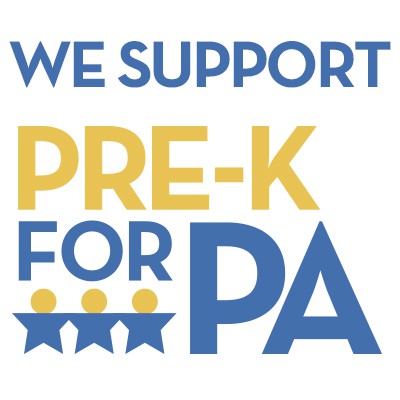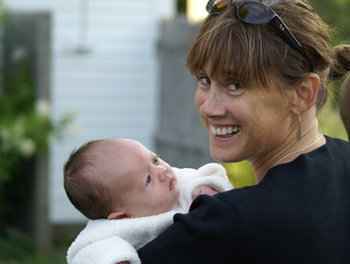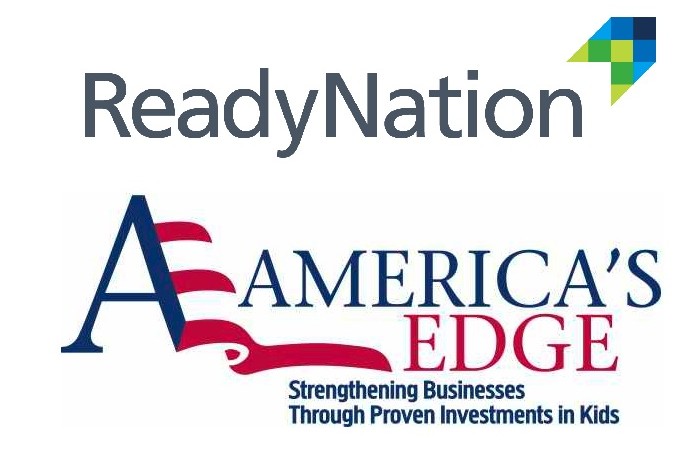
Congratulations on being chosen by your respective parties as candidates for governor in the 2014 general election.
Through the course of the primary campaign, you may have noticed a determined group advocating for a large segment of Pennsylvania citizens that can’t vote: children. Pre-K for PA launched in late January, and has since signed up thousands of Pennsylvanians who support our cause of making high-quality pre-k accessible to all 3- and 4-year-olds in Pennsylvania. Polling shows this issue has broad bi-partisan support.
Pre-K for PA has the support of many business leaders throughout the commonwealth. Among those leaders, we are proud that David L. Cohen penned an op-ed published last month in The Philadelphia Inquirer that stated: “Early-childhood education today is not just a ‘nice to have’ – it is an educational, moral, and societal imperative essential to building the workforce of the future. I am proud to support a statewide coalition (Pre-K for PA) of 10 leading organizations that are working to change the future for Pennsylvania’s children.”
Pennsylvania slipped on both preschool access and resource rankings in 2012-2013, according to the latest State of Preschool Yearbook from the National Institute for Early Education Research (NIEER). Pennsylvania now ranks 30th out of 41 states that provide pre-k access for 4-year-olds (down from 28th a year earlier), enrolling only 12 percent of 4-year-olds.
The State of Preschool report only underscores the urgency for making state investments in high-quality pre-k a priority. Many other states are more aggressively investing in pre-k because they know it has a proven, long-term return on investment. Pennsylvania needs to pick up the pace or risk falling further behind.
Only 1 in 6 of Pennsylvania’s 3- and 4-year-olds has access to high-quality, publicly funded pre-k. We ask that you make changing that dismal statistic a priority in your campaign for governor, because it is clear we can do much better.
Pre-K for PA is prepared to share with your campaign the many creative ways other states have broadened access to pre-k. The examples come from states as diverse as Oklahoma, Maryland, Illinois, West Virginia, Georgia, New York and more. What they have in common is the political will to provide the best opportunity for their youngest citizens.
Between now and the general election, Pre-K for PA will be aggressively expanding our leadership and grassroots support. While the campaign will not endorse, we will be reaching more and more voters who will want each gubernatorial candidate to make a clear and convincing case that, if elected, he will make access to high-quality pre-k a reality for every 3- and 4-year-old in the commonwealth by 2018. We hope to work with you to offer ideas for how that can happen while we grow our local support in ways that demonstrate to you the political wisdom of incorporating the goals of Pre-K for PA into your campaign’s policy goals in order to support a winning election strategy for governor.
Sincerely,
Sharon Easterling, Delaware Valley Association for the Education of Young Children
Steven Wray, Economy League of Greater Philadelphia
Bruce Clash, Fight Crime: Invest in Kids
Steve Doster, Mission: Readiness
Jodi Askins, Pennsylvania Association for the Education of Young Children
Blair Hyatt, Pennsylvania Head Start Association
Joan Benso, Pennsylvania Partnerships for Children
Michelle Figlar, Pittsburgh Association for the Education of Young Children
Donna Cooper, Public Citizens for Children and Youth
Diane Castelbuono, United Way of Greater Philadelphia and Southern New Jersey

Real Mom TV: Joey Fortman
Special guest blog: Pre-K for PA’s Focus on Mother’s Day.
Joey Fortman from Real Mom Media is our special guest video blogger with a Mother’s Day message about Pre-K for PA and why she loves being a mom. For more visit www.joeyfortman.com/real-mom-tv/

Mother’s Day: Why this Mom wants pre-k for PA
By Jen Bradley, Philly Parenting
Special to Pre-K for PA’s Focus on Mother’s Day: #MOMS4PREK
Long before I became a mom, I was a teacher. I taught preschool-aged children in Baltimore City. I remember the hearing daunting statistics that loomed over the children I taught each day. My colleagues and I were determined to help prevent those “facts” from becoming reality for our kids.
The facts on the benefits of pre-k are pretty clear too:
The preschool years are a critical time period for development.
Children in high quality pre-k have strong outcomes which last into adulthood.
Publicly-funded pre-k helps the economy in many, many ways.
Pre-k helps support families.
Pre-k is a powerful crime prevention tool.
Children who enroll in pre-k start school ready to learn.
I learned about many of these facts years later in graduate school. They are each powerful, and any one of them could stand alone as reason enough to fund Pre-k in our state.
But while the research and facts are solidly compelling, I still go back to those days of working with three and four year olds to see the true benefit of publicly funded preschool education.
Each day I taught, I could see the joy as the children entered the room.
I could feel the warmth as they greeted me with hugs.
I noted the wonder as we read new books together, and learned to write and count and create and investigate.
I saw their wheels turning as they experimented at the water table.
I could see their future mommy and daddy selves being nurtured as they cared for their baby dolls.
I heard their diplomacy muscles being flexed as they worked to find peaceful ways to resolve conflicts.
I knew then, in the midst of all those daunting statistics and well before I read the research showing the benefits of pre-k… that what really mattered most were those moments in our classroom.
What mattered was how the children and I spent our days. How we created a joyful learning community where we all felt safe and loved and eager to learn. I knew that it was enough just to value that time we had together.
All of that other stuff I know now… icing on the cake.

By Sara Watson, National Director of ReadyNation/America’s Edge
There are many compelling reasons for supporting high-quality pre-kindergarten education. You might be told quality pre-k programs can lead to reductions in crime, improvements in public health and nutrition, and stronger families—all of which are true. But there are strong, bottom-line economic benefits as well.
The business leaders of ReadyNation/America’s Edge know this, which is why we are dedicated to strengthening businesses by expanding quality pre-k opportunities. These programs bring immediate and long-term benefits to families and communities.
IMMEDIATELY, we see a return on investment in the sale of local goods and services that outpaces many other economic sectors. Pre-k programs also create jobs; in fact, according to the IMPLAN economic data for Pennsylvania, a $1 billion investment in high-quality pre-K would create almost 28,000 jobs in Pennsylvania, including 5,600 jobs outside the early learning sector. In addition, quality pre-k programs help to reduce employee absenteeism, a problem that costs U.S. businesses $3 billion annually.
IN THE FUTURE, we will have a stronger workforce made up of children who were given a strong foundation for success and grew into productive adults. High-quality pre-k programs, especially for disadvantaged children, can increase high school graduation rates, the likelihood of being consistently employed, and lifetime earnings as well.
We know that quality pre-k is essential for our kids and for our economy. Now it is up to us to make it happen for Pennsylvania’s children.
Sara Watson is the National Director of ReadyNation/America’s Edge. To view the report “Strengthening Pennsylvania Businesses through Investments in Pre-Kindergarten,” please click here.


By Celinda Lake and Christine Matthews
It’s election season in Pennsylvania. And unless you haven’t turned on the television or radio, picked up a paper or logged on to almost any website, you’ve been hearing candidates talk a lot about jobs and education.
What they say about early childhood education, however, might seem pretty vague. Given what we see in the polling we’ve done in Pennsylvania, and the prominent attention pre-k has gotten in other high-profile races around the country, that shouldn’t be the case.
It was a central issue in the recent New York City mayor’s race, and it’s a simmering one in the hotly contested race for governor in Texas. Why now? And why in such very different political environments?
Pennsylvania voters believe pre-k can improve a child’s social skills, which helps them through grade school. They see the long-term benefits in terms of better test scores, graduation rates, and lifetime earnings and employment.
And voters are right: The proven benefits of pre-k, both short and long-term – for kids, for schools and for the economic benefits – are indisputable. The results in the many states that have implemented universal pre-k stand as a significant piece of evidence, as does decades of research by experts in early childhood education.
The political consensus around high-quality pre-k nationally may also reflect what our research in Pennsylvania tells us: there is broad bi-partisan support for pre-k. In all, 83 percent of Democrats, 61 percent of Independents and 56 percent of Republicans favor ensuring every 3- and 4-year-old in Pennsylvania has access to voluntary, high-quality pre-k programs.
In fact, a majority of Pennsylvania likely voters (59 percent) see the benefit as so clear that they support increased state funding for such programs. Pennsylvania voters, like those in many other states, recognize the results justify the investment.
In an important election year, something else stood out in our research: Pennsylvania voters say they are more likely to vote for candidates for elected office if they favored increasing funding for pre-k programs, and less likely to vote for those who opposed increasing funding.
Right now, only 1 in 6 of Pennsylvania’s 3- and 4-year-olds has access to high-quality pre-k. Candidates for governor and other offices on the ballot in this election cycle might benefit from recognizing an issue with clear, broad public support that is bolstered by scientific research and the experience of other states. If they don’t follow the lead of states that are succeeding in this approach, perhaps they might follow the will of the voters in Pennsylvania.
More information about the Lake/Bellwether survey can be found by clicking here. Celinda Lake is president of Lake Research Partners and Christine Matthews is president of Bellwether Research and Consulting.










